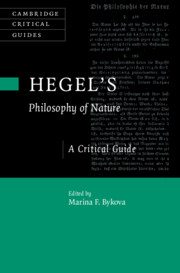Book contents
- Hegel’s Philosophy of Nature
- Cambridge Critical Guides
- Hegel’s Philosophy of Nature
- Copyright page
- Dedication
- Contents
- Contributors
- Acknowledgments
- Abbreviations
- Hegel’s Philosophy of Nature
- Part I Hegel’s Philosophy of Nature in the Historical and Systematic Context
- Part II Cosmology, Mechanics, and Physics
- Chapter 6 Hegel’s Dissertation on the Orbits of the Planets
- Chapter 7 Hegel’s Syllogism of Analogy and Organic Conception of Cosmic Life
- Chapter 8 Hegel’s Mechanics as a System of Steps from Space and Time to Celestial Motion
- Chapter 9 Logic and Physics in Hegel’s Philosophy of Nature
- Part III Organics
- Part IV On Contemporary Challenges for the Philosophy of Nature
- Bibliography
- Index
- Cambridge Critical Guides
Chapter 7 - Hegel’s Syllogism of Analogy and Organic Conception of Cosmic Life
A Speculative Kantian Legacy in His Absolute Mechanics?
from Part II - Cosmology, Mechanics, and Physics
Published online by Cambridge University Press: 19 December 2024
- Hegel’s Philosophy of Nature
- Cambridge Critical Guides
- Hegel’s Philosophy of Nature
- Copyright page
- Dedication
- Contents
- Contributors
- Acknowledgments
- Abbreviations
- Hegel’s Philosophy of Nature
- Part I Hegel’s Philosophy of Nature in the Historical and Systematic Context
- Part II Cosmology, Mechanics, and Physics
- Chapter 6 Hegel’s Dissertation on the Orbits of the Planets
- Chapter 7 Hegel’s Syllogism of Analogy and Organic Conception of Cosmic Life
- Chapter 8 Hegel’s Mechanics as a System of Steps from Space and Time to Celestial Motion
- Chapter 9 Logic and Physics in Hegel’s Philosophy of Nature
- Part III Organics
- Part IV On Contemporary Challenges for the Philosophy of Nature
- Bibliography
- Index
- Cambridge Critical Guides
Summary
While dismissing what he regards as empty, extrinsic use of analogy in the spurious play of contemporaneous philosophies of nature, Hegel acknowledges the importance of analogy and appreciates its role in many empirical scientific discoveries. In the Logic, Hegel provides a speculative-rational criterion to distinguish between superficial and well-grounded analogies, for both inorganic and organic bodies, using an example of his “syllogism of analogy” drawn from celestial mechanics. Hegel’s point is that, from the standpoint of philosophical science, what empirical science may view only as “parts” of a complex form are essentially mutually related as interdependent moments of one whole. This chapter discusses the role of analogy in Hegel’s Absolute Mechanics, accounting for his view that the structural or constitutive form of the organism already begins to appear in the ‘ideal’ point of unity which governs the movement of free, independent bodies in the solar system, and for his reappraisal of the solar system as manifesting a thoroughgoing unity (Physics). Finally, this chapter argues for the thesis of a sufficient legacy of Kant’s analogical theory of the arrangement of the heavenly bodies in Hegel’s self-sublating finite mechanical account of the starry vault in his Philosophy of Nature.
Keywords
- Type
- Chapter
- Information
- Hegel's Philosophy of NatureA Critical Guide, pp. 138 - 157Publisher: Cambridge University PressPrint publication year: 2024

